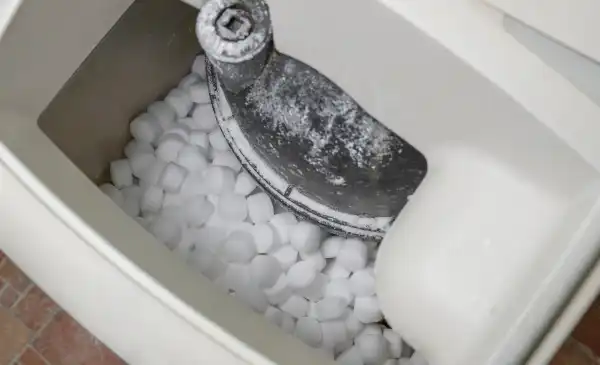
Water softeners, also sometimes called ion exchange units, remove minerals like magnesium and calcium that cause hard water. This helps the soap to lather better and results in less mineral buildup in appliances and plumbing pipes.
If you’ve been dealing with hard water in your home, Mr. Rooter Plumbing can help you figure out the best water softener solution for your needs.
How Does a Water Softener Work?
Modern water softening units often contain two tanks: a softener tank filled with resin beads and a brine tank filled with salt pellets or beads. As water runs into the softener tank, it percolates through the resin beads and sheds positively charged minerals like calcium and magnesium. By the time the water reaches the outlet pipe of the water softener tank, the calcium and magnesium ions have been removed and the water is now softened.
The brine tank is used to regenerate the resin beads as required.
The result is softer water, and the mineral waste products of the softening process drain out of the system and become wastewater. The primary maintenance any homeowner should need to do for their water softener is to regularly check the level of the salt pellets and add more when needed.
Related Topic: Do I Need a Water Softener?
Does a Water Softener Remove Iron?
Standard water softeners remove a small amount of iron. If you have high iron content in your water, a plumber might recommend installing both a water softener and an additional separate iron filtering system.
Are Water Softeners Bad for Septic Systems?
No, water softeners are not bad for septic systems as long as both the softener unit and septic system are in good working condition. However, if your septic system isn’t functioning properly, softened water might throw off the bacterial balance in the system.
Can You Drink Softened Water?
Yes, you can drink softened water. Only trace amounts of the salt used in the softening process get into the water itself, so softened water tastes fine and is perfectly safe to drink. However, those with sensitive taste buds might pick up a slightly salty aftertaste.
Find Water Softener Services Near You
Dealing with hard water means unwanted wear and tear on your appliances, plumbing, and water heater. Hard water can also stain sinks and toilets. And soap used for laundry and bathing may not lather properly, which can leave your hair looking dull and lifeless.
If you’re considering having a water softener installed at your home, talk to your local plumbing experts at Mr. Rooter. We can inspect your current system and make recommendations on the best options for you and your family. To learn more, call us or request an estimate online today.

